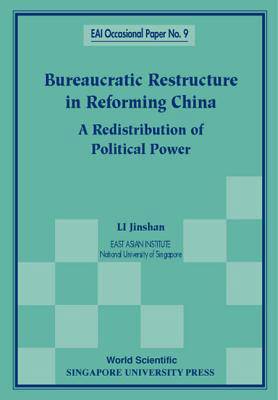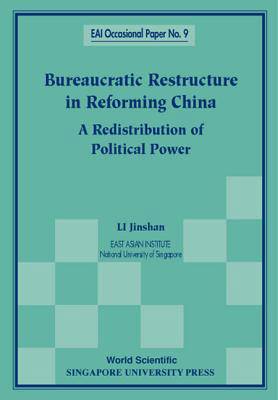
Bedankt voor het vertrouwen het afgelopen jaar! Om jou te bedanken bieden we GRATIS verzending (in België) aan op alles gedurende de hele maand januari.
- Afhalen na 1 uur in een winkel met voorraad
- Gratis thuislevering in België vanaf € 30
- Ruim aanbod met 7 miljoen producten
Bedankt voor het vertrouwen het afgelopen jaar! Om jou te bedanken bieden we GRATIS verzending (in België) aan op alles gedurende de hele maand januari.
- Afhalen na 1 uur in een winkel met voorraad
- Gratis thuislevering in België vanaf € 30
- Ruim aanbod met 7 miljoen producten
Zoeken
Bureaucratic Restructure in Reforming China: A Redistribution of Political Power
Jinshan Li
€ 12,95
+ 25 punten
Omschrijving
Since the introduction of the Dengist reform in the late 1970s, the state bureaucracy in China has experienced four major restructurings, each of which entailed the redistribution of political power. According to the purpose and scale of reorganization, the restructuring of the State Council can be divided into two stages. At the first stage, covering the period 1982 to 1997, Deng Xiaoping and his Executives, Zhao Ziyang and Li Peng, restructured part of the government administration in order to integrate market forces into the central-planning system. The integration was not smooth because of the struggles between reformers and conservatives, so the restructuring met with a backlash. After the Ninth National People's Congress in March 1998, the restructuring has entered its second stage, characterized by a radical retrenchment of government organizations and employees both at the central and local levels. In carrying this out, Zhu Rongji intends to relinquish government links with enterprises, thus pushing the "socialist market economy" further ahead.
Specificaties
Betrokkenen
- Auteur(s):
- Uitgeverij:
Inhoud
- Aantal bladzijden:
- 44
- Taal:
- Engels
- Reeks:
- Reeksnummer:
- nr. 9
Eigenschappen
- Productcode (EAN):
- 9789810237066
- Verschijningsdatum:
- 17/12/1998
- Uitvoering:
- Paperback
- Formaat:
- Trade paperback (VS)
- Afmetingen:
- 204 mm x 140 mm
- Gewicht:
- 86 g

Alleen bij Standaard Boekhandel
+ 25 punten op je klantenkaart van Standaard Boekhandel
Beoordelingen
We publiceren alleen reviews die voldoen aan de voorwaarden voor reviews. Bekijk onze voorwaarden voor reviews.









